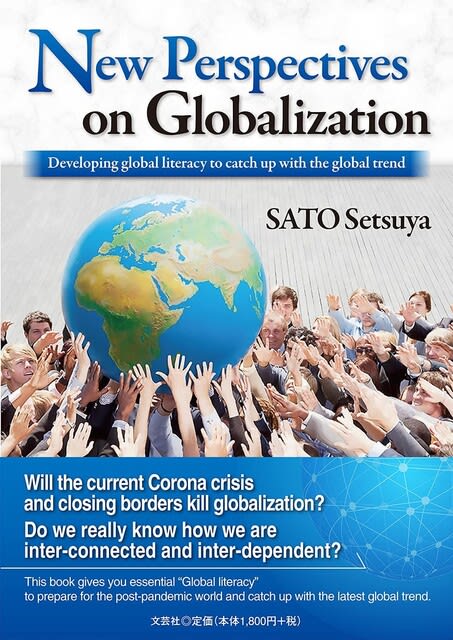
本日のGetUpEnglishも佐藤節也東洋大学教授のNew Perspectives on Globalizationを紹介する。
https://blog.goo.ne.jp/getupenglish/e/c15f056929357dbfdf38cecb9232171b
https://blog.goo.ne.jp/getupenglish/e/eabf76a4daeb33137051b4ebe0e41e9b
14章ではコロナ以降のグローバリゼーションについて、各メディアの報道を引用しつつ、考察している。
Chapter 14 Globalization and You (How to Face Up to Globalization)
This final chapter urges the reader to relate oneself with globalization, particularly with the world after the coronavirus disease pandemic; hence this chapter is titled “Globalization and You (or How to Face Up to Globalization).”
Some people blame globalization for the spread of the coronavirus disease around the globe by allowing infected people to travel crossing borders. However, should we kill globalization just for that?
During 2020, numerous articles were published by leading media to discuss if COVID-19 means the end of globalization. The following are some examples:
・Henry Farrell and Abraham Newman of Foreign Affairs wrote, “… the lesson of the new coronavirus is not that globalization failed. The lesson is that globalization is fragile, despite or even because of its benefits.”
・Robert Armstrong of The Financial Times wrote, “Coronavirus is a global crisis, not a crisis of globalization,” “The distinction is important, because if politicians and business leaders take the wrong lessons from this crisis, the world will be less prepared for the next.”
・Zachary Karabell of The Wall Street Journal argues, “The Covid-19 pandemic is closing borders and disrupting supply chains, but it can’t stop our long-term movement toward a more interconnected world.”
・As we studied in Chapter 5, the DHL/NYU survey that tracks the movement of four things (i.e., people, money, goods, and ideas) shows a decline of movements of people, goods, and money, but information flows increased tremendously. Based on this observation, Gillian Tett of The Financial Times highlighted, “the globalisation of information fuels global ecommerce, making cross-border supply chains more flexible — and boosting collaboration in areas such as vaccine research.” She then argued, “Covid-19 has caused globalisation to mutate, but not killed it off. Indeed, 2021 might yet deliver a surprising recovery.” Phase one of globalization may end, but simply advance to Phase two. This means the risks we are experiencing from the coronavirus disease now will never disappear. We need to learn from today's lessons to restructure and reconstruct how we respond to the crisis to prepare for the future.
・Peter Goodman of The New York Times wrote, “The coronavirus itself does not respect borders, requiring international coordination, a process facilitated by the infrastructure of globalization. … The answer is not to again build walls. You need more cooperation and clear information.”
・Yuval Noah Harari, a historian, philosopher, and the bestselling author of Sapiens, Homo Deus, and 21 Lessons for the 21st Century, wrote for TIME magazine, “The real antidote to epidemic is not segregation, but rather cooperation.” He argues, “In this moment of crisis, the crucial struggle takes place within humanity itself. If this epidemic results in greater disunity and mistrust among humans, it will be the virus’s greatest victory. When humans squabble — viruses double. In contrast, if the epidemic results in closer global cooperation, it will be a victory not only against the coronavirus, but against all future pathogens.”
強くお薦めしたい1冊だ。
Setsuya Sato
New Perspectives on Globalization
Developing global literacy to catch up with the global trend
https://www.amazon.co.jp/Perspectives-Globalization-Developing-global-literacy/dp/4286231232






















